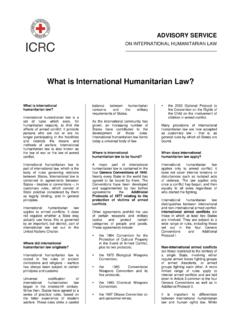Transcription of International Humanitarian Law and Human Rights Law
1 International Humanitarian Lawand Human Rights Lawby Louise Doswald-Beckand Sylvain ViteIntroductionInternational Humanitarian law is increasingly perceived as part ofhuman Rights law applicable in armed conflict. This trend can betraced back to the United Nations Human Rights Conference held inTehran in 19681 which not only encouraged the development ofhumanitarian law itself, but also marked the beginning of a growinguse by the United Nations of Humanitarian law during its examinationof the Human Rights situation in certain countries or during its thematicstudies. The greater awareness of the relevance of Humanitarian law tothe protection of people in armed conflict, coupled with the increasinguse of Human Rights law in International affairs, means that both theseareas of law now have a much greater International profile and areregularly being used together in the work of both International andnon-governmental , as Human Rights law and Humanitarian law have totallydifferent historical origins, the codification of these laws has until veryrecently followed entirely different lines.
2 The purpose of this paper isto consider the philosophy of these two branches of law in the light oftheir origins, how in many essential respects they nevertheless coin-cide, how they have influenced each other in recent developments and,finally, to consider how their similarities and differences could influ-ence their future Resolution XXIII " Human Rights in Aimed Conflicts" adopted by theInternational Conference on Human Rights , Tehran, 12 May and nature of Human Rights law andhumanitarian lawThe philosophy of Humanitarian lawRestrictions on hostile activities are to be found in many culturesand typically originate in religious values and the development of mili-tary philosophies.
3 The extent to which these customs resemble eachother is of particular interest and in general their similarities relateboth to the expected behaviour of combatants between themselves andto the need to spare Traditional manuals of humani-tarian law cite the basic principles of this law as being those of mili-tary necessity, humanity and The last criterion seems out ofplace in the modern world, but it is of importance for an under-standing of the origin and nature of Humanitarian first factor of importance is that Humanitarian law was devel-oped at a time when recourse to force was not illegal as an instrumentof national policy.
4 Although it is true that one of the influences on thedevelopment of the law in Europe was the church's just wardoctrine,4 which also encompassed the justice of resorting to force, thefoundations of International Humanitarian law were laid at a time whenthere was no disgrace in beginning a war. The motivation for restraintin behaviour during war stemmed from notions of what was consid-ered to be honourable and, in the nineteenth century in particular, whatwas perceived as The law was therefore in large part basedon the appropriate respect that was due to another professional will use here as a good illustration of the philosophy underlyingthe customary law of war the Lieber Code of 1863,6 as this code was2 For an interesting survey of these customs from different parts of the world, seePart 1 of International Dimensions of Humanitarian Law, UNESCO, Paris, HenryDunant Institute, Geneva, See, for example, L.
5 Oppenheim, International Law, Volume II, Disputes, Warand Neutrality, Seventh edition, Longmans and Green, London, 1952, pp. For a good summary of these doctrines, see S. Bailey Prohibitions andRestraints in War, Oxford University Press, 1972, Chapter There are frequent references in the preambles of nineteenth centuryhumanitarian law instruments to civilization requiring restraints in warfare, forexample, the Declaration of St. Petersburg of 1868 to the effect of prohibiting the useof certain projectiles in war time: "Considering that the progress of civilization shouldhave the effect of alleviating as much as possible the calamities of "; 1899 HagueConvention II with Respect to the Laws and Customs of War on Land: "Animated bythe desire to the interests of humanity and the ever increasing requirements ".
6 6 Instructions for the Government of Armies in the Field, 24 April 1863,95used as the principal basis for the development of the Hague Conven-tions of 1899 and 1907 which in turn influenced later relevance of war being a lawful activity at the time is reflectedin Article 67 of the Lieber Code:"The law of nations allows every sovereign government to makewar upon another sovereign state, and, therefore, admits of no rulesor laws different from those of regular warfare, regarding the treat-ment of prisoners of war, although they may belong to the army of agovernment which the captor may consider as a wanton and unjustassailant".The law was therefore based on what was considered necessary todefeat the enemy and outlawed what was perceived as unnecessarycruelty:"Military necessity, as understood by modern civilized nations,consists in the necessity of those measures which are indispensable forsecuring the ends of the war, and which are lawful according to themodern law and usages of war" (Art.)
7 14)."Military necessity does not admit of cruelty that is, the inflic-tion of suffering for the sake of suffering or for revenge, nor ofmaiming or wounding except in fight, nor of torture to extort confes-sions. It does not admit of the use of poison in any way, nor of thewanton devastation of a " (Art. 16).Two basic rules of International Humanitarian law, namely theprotection of civilians and the decent treatment of prisoners of war, aredescribed in the following terms:"Nevertheless, as civilization has advanced during the lastcenturies, so has likewise steadily advanced, especially in war on land,the distinction between the private individual belonging to a hostilecountry and the hostile country itself, with its men in arms.
8 The prin-ciple has been more and more acknowledged that the unarmed citizenis to be spared in person, property, and honour as much as theexigencies of war will admit" (Art. 22).The importance of respectful treatment of prisoners of war isreferred to as follows:prepared by Francis Lieber during the American Civil War, and promulgated byPresident Lincoln as General Orders N 100. Reproduced in Schindler and Toman,eds., The Laws of Armed Conflicts, Martinus Nijhoff Publishers, Dordrecht, HenryDunant Institute, Geneva, "A prisoner of war is subject to no punishment for being a publicenemy, nor is any revenge wreaked upon him by the intentional inflic-tion of any suffering, or disgrace, by cruel imprisonment, want offood, by mutilation, death, or any other barbarity" (Art.)
9 56)."Honorable men, when captured, will abstain from giving to theenemy information concerning their own army, and the modern law ofwar permits no longer the use of any violence against prisoners inorder to extort the desired information or to punish them for havinggiven false information" (Art. 80).On the protection of hospitals the Lieber Code states:"Honorable belligerents often request that the hospitals within theterritory of the enemy may be designated, so that they may " (Art. 116)."It is justly considered an act of bad faith, of infamy or fiendish-ness, to deceive the enemy by flags of " (Art. 117).The chapter relating to occupied territory specifies the action thatan occupier may take for military purposes, in particular levying taxesand similar measures, but is very clear about the types of abuses thatare prohibited.
10 "All wanton violence committed against persons in the invadedcountry, all destruction of property not commanded by the authorizedofficer, all robbery, all pillage or sacking, even after taking a place bymain force, all rape, wounding, maiming, or killing of such inhabi-tants, are prohibited under the penalty of death, or such other severepunishment as may seem adequate for the gravity of the soldier, officer or private, in the act of committing such violence,and disobeying a superior ordering him to abstain from it, may belawfully killed on the spot by such superior" 7 (Art. 44).Finally, in this small selection of articles, mention should be madeof Lieber's caution to States in their resort to reprisals which were stillgenerally considered lawful at that time:"Retaliation will.









